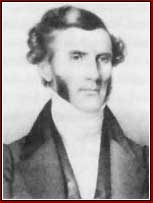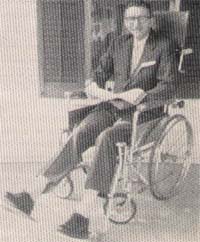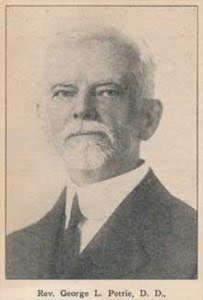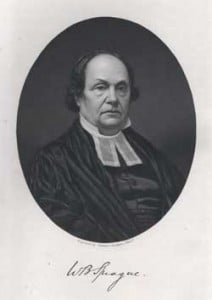A Father’s Instruction, and A Son’s Rejection
The Rev. William Hamilton Jeffers, D.D., LL.D., was born at Cadiz, Ohio, on May 1, 1838. His parents were members of the Covenanter Church (i.e., the Reformed Presbyterian Church of North America], and Dr. Jeffers received the strict religious training which was customary in this communion. He took his college course at Geneva College and graduated in 1855. For his theological training he attended Xenia Theological Seminary, which became one of the leading institutions of the United Presbyterian Church of North America (UPCNA), completing his ministerial training in the year 1859.
At the time of graduation from the Seminary, he left the church of his fathers and became a member of the United Presbyterian body, and began his career as a preacher by spending one year in the West in home missionary work, but hardship and exposure broke his health. He then began his pastoral work at Bellfontaine, Ohio, serving the United Presbyterian church there from 1862-1866. These years included some of the most stirring days of our national history, when the scourge of civil war threatened the Union and the foundations of our government. Like many of the young ministers of that day, he heard his country’s call, not to take up arms in her defense, but to minister to the soldiers in the camp and on the battle field by bringing to them the comforts of the Christian faith. Within the circle of his family he spoke of these days with satisfaction. As a chaplain he had more than average success.
During his college and seminary days Dr. Jeffers had shown a special aptitude for the study of languages, and had made himself a proficient scholar not only in the classical tongues, but also in Hebrew. When he was just twenty-eight years old, he was appointed a member of the committee charged with revision of the Psalter for the UPCNA. In many cases he found it impossible to make a mere revision, and so was compelled to produce an entirely new version.
While Dr. Jeffers served notably as a pastor, his chief work was as a teacher. Beginning in 1877, he taught for twenty-six years at the Western Theological Seminary in Pittsburgh. In his prime he was considered one of the ablest instructors in the institution. The students recognized that he was a clear thinker, not only conversant with the details of his own department, but more or less familiar with the chief results of investigation in other fields of theological scholarship. With his career there beginning in 1877, Dr. Jeffers would have been one of Robert Dick Wilson’s professors, though Wilson already excelled in his Hebrew studies by the time he attended Seminary.
Investigation reveals that Dr. Jeffers published very little, and only three pieces have been discovered. His inaugural address, when he was inducted into the chair as professor of Old Testament Literature and Exegesis, in 1877, was titled The Importance of the Study of the Old Testament Scriptures. Besides a single lecture published in the Western Seminary’s Bulletin, the only work from his pen was a Memoir on the life of the Rev. Samuel Jennings Wilson, published as an introduction to the latter’s posthumously published Occasional Addresses and Sermons (1895). Apparently Jeffers was reluctant to put anything into print, partly because of his high ideals of scholarship, and partly because of an great sensitivity to criticism.
Sincere adherence to his convictions and a loyalty to his friends were marked characteristics of this humble man of God. As might be expected of a man of his temperament, he was very devoted to his family, and lavished his love and care on his wife and children.
As true as that must have been, however, the story becomes both confusing and painfully interesting when we begin to look at the lives of his two sons. The younger son, Hamilton [1893-1978], became a noted astronomer, and I could not discover anything as to whether he was or was not a Christian. The other son, John Robinson Jeffers [1887-1962], grew up to become a renowned poet of the American West, but was, at the same time, a deeply troubled and profligate son who, so far as we can see, never repented. His works were full of biblical imagery, but Robinson Jeffers, for all appearances, rejected the Christian faith of his father.
Words to Live By:
Certainly from this distance we cannot say what went wrong, nor can we understand why Robinson Jeffers rejected the gospel, given his father’s testimony and example. It is curious to find that while the biblical scholar is largely forgotten today, there is an artistic community that keeps alive the works of the poet son. Parenting is an act of faith, lived out in full dependence upon the only God who saves to the uttermost. As PCA pastor Bill Iverson is fond of saying, “God has no grandchildren,” — meaning that the work of evangelism must be done afresh in every generation. Or as T. D. Witherspoon urged parents, “Don’t think that you have to wait to talk to your children about spiritual matters.” This is where the Catechism is so helpful, because it brings these issues up for discussion around the family table. Catechize your children; pray with your children; pray for your children!




